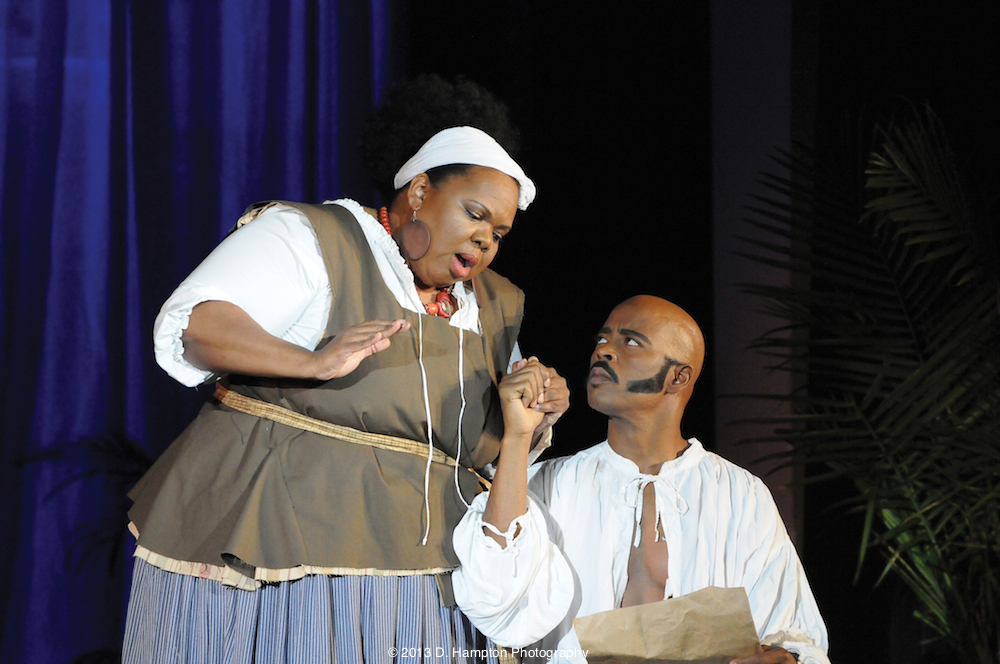
Langston Hughes was brought up hearing stories about the Haitian Revolution from his grandmother, and he had long been drafting a play about the revolution when the opportunity for an opera arose. This is “Troubled Island,” composed by William Grant Still and written by Hughes and Verna Arvey. Until Maestro Leslie Dunner led a performance at the South Shore Cultural Center on Saturday, the show had not been seen in its full form since 1949. That was enough to attract Lesly Condé, consul general of Haiti. “The story of Haiti is rich in stories that could inspire many a poet, playwright, or composer,” he told the audience in an introduction to the performance.
The show was a one-night-only revival by the South Shore Opera Company of Chicago, meant to give “Troubled Island” another shot after a rocky past. When it premiered in New York in 1949, it garnered numerous standing ovations, but it was almost uniformly panned by the press. A critic in Time wrote that “Poet Hughes’s libretto turned out to have far more peroration than punch,” while “composer Still’s music often had more prettiness than power.” Perhaps more damningly, the reviewer concluded that, “in all, ‘Troubled Island’ had more of the soufflé of operetta than the soup bone of opera.”
Since then, there have been no full productions, despite the massive legacies of both Still and Hughes. The South Shore performance marked its Chicago premiere and also, the first performance of “Troubled Island” with an all-black cast (rather than a white cast with masks), as Still and Hughes almost certainly intended.
This history was clearly a motivating factor; Kirk Walker, who led the performance in the role of Jean-Jacques Dessalines, a prominent figure of revolutionary Haiti, said that to be a part of such a historic production was “frickin’ awesome.” Cornelius Johnson, artistic director of the South Shore Opera Company, called it a tribute to the “dean of Afro-American Composers,” as Still is known, and a chance to perform what Johnson says is “his crown glory.” Though Still is best known for his “Afro-American Symphony,” which features the same distinct integration of jazz and blues as “Troubled Island,” he really wanted to be an opera composer, and “Troubled Island” is said to have been his favorite of his operas.
Seats were appropriately scarce at the Cultural Center’s Paul Robeson Theater. The opera’s opening chords established a rich, jazz-based sound that gave the entire first act a very comfortable, perhaps sensual, feeling that was quite unusual for opera. Frequent use of extended chords could be heard through much of the first act. Contralto Gwendolyn Brown, who sang the role of Azelia, Dessalines’ wife from his slave days, was an integral part of this textural richness. Her duet with Walker emphasized the opera’s jazz influences, as the pair concluded their duet on the seventh of a chord, which would never have happened in a more classical opera.
The first act, which described the lives of Haitian slaves before the revolution, culminated in a voodoo ritual that showcased the production’s hand-drummers and dancers, who joined forces remarkably with the chorus and pianos. The finale of this act, in which the ensemble exited through the audience, surrounded listeners with sounds and brought the drama to the audience (though during the quieter arias and duets, the pianos were somewhat too loud).
With the second act, the opera moved to the period after the French rule of Haiti had been overthrown, and after Dessalines had made himself emperor. It shattered the first act’s distinct texture in favor of something more traditionally “operatic” and European; after the opening’s warm flow, this traditional turn actually made for a rather jarring effect. Dessalines’ empress, Claire (the soprano Dana Campbell), and a half-black, literate counterrevolutionary named Vuval (performed by Johnson), combined for a sugary and inauthentic duet, as they schemed about overthrowing Dessalines and eloping to Paris.
At first, this saccharine façade continued into the third act, with a French minuet composed to sound deliberately out of place. But an interruption by the traditional voodoo ensemble from the first act provided a somewhat disruptive return to the more directly rhythmic African style, and emphasized the deliberately imitative nature of the preceding European music. With the raw character of the first act reborn, Dessalines learned of the developing rebellion against him, showing that while he may have changed his demeanor as the emperor, he remained unchanged inside. There’s an ironic twist to this return, since it is Vuval and others who had formerly been more privileged than Dessalines who lead the counterrevolution against him.
Maestro Dunner describes the Dessalines of “Troubled Island” as three historical figures wrapped into one, containing both the beginnings of the revolution and the compassionate press for universal educational reform, in addition to the more brutal aspects of Dessalines’ rule, such as his push at the end of the third act to make all men return to the soil—even those who were not previously slaves—and into a state of near-slavery. Or, as Walker put it, Dessalines was in many ways “a cross between Hannibal Lecter and Martin Luther King.”
The counterrevolutionaries emerged to challenge him in the final act; Stenio (sung by the baritone Antonio Watts), Vuval’s cousin, engages Dessalines in a duel. There is a tragic nature to the conclusion, but it is also uplifting; the Haitian people do win. At the end of the performance, the crowd was left in rapturous applause.
“I’m not the star,” said Walker before the performance, though he later received the final burst of applause during the opera’s curtain call. “The opera is the star. William Grant Still, Langston Hughes, Verna Arvey, they’re the stars.”
The South Shore Opera Company of Chicago has shown that “Troubled Island,” despite its troubled history, is an opera worthy of its creators’ reputations.
